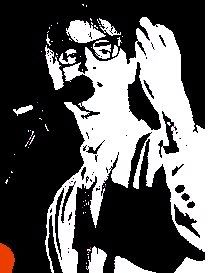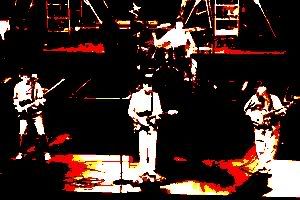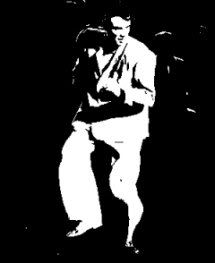Academica Sinica, Taipei, Taiwan: Your Number One Source for Chinese History

On July 1st, I went with Cindy to Academica Sinica. I went, that Friday, to hear one man speak. His name isn't terribly important. Cindy watches University departments like a hawk, and her word had it that this guy was like tapioca on shaved ice. I'd read his paper the night before.
By the looks of it, I was the only one. Well, that's not true, entirely. There were about twelve old men and about as many women who looked interested in what our man was talking about, which I'll get to.
The auditorium itself wasn't particularly inspiring. Had florescent overheads, the panel variety. Asbestos tiles. Four wood-paneled columns stood to either side of the room. Between them were PA speakers. All of the money went into the chairs. Which were very comfortable. And heavy.
I saw lots of people lounging, I saw a lot of vacant stares. Kind of looked like my afternoon class. It was about nine-twenty a.m..
Most of the papers being discussed at the conference were in Chinese. I had a look at our guy's paper the night before, like I said. Cindy had been given a fat stack of them, with an attractive burlap carrying case, when she got there Wednesday morning. I was at work.
I only had time to read his paper, anyway. He wrote about an emerging field in Chinese history. He was looking at consumption patterns among the Chinese from the Qing Dynasty (seventeenth century to 1911) to early Republican China (1911-30's). Consumption was defined very broadly, to include anything/service/whatnot that someone spent money on.
What struck me about his paper, early on, was a reference to Buddhist laity. The professor was writing that one thing we needed to bear in mind was the fact that the average Chinese had to pay for religious services, as opposed to the tithing the peasantry suffered in Europe. I'd actually never thought of that, and I appreciated the insight.
That's what kept me interested in his paper, which wasn't very good, altogether. After reading it, I remember basically thinking “So what?”
We showed up a little late. Our guy was scheduled to go on first, and we walked in just as he was getting to the bit about the Buddhist laity. That meant, if he was sticking to his paper, that we only missed a little bit. We sat down. Listened. I was soon very sad to realize that he was sticking to his paper almost verbatim. I was disappointed, at the time, that he was only saving the audience the trouble of reading the paper for themselves. It's pretty much accepted that people don't read these things.
Yeah, so what, that's the way conferences go. . . that's horseshit!

Considering the alternative would be to have the guy stand up there, assuming everyone's already read his work, and then elaborate and flesh out his ideas before a living mass of people, I'd say I got screwed out of what could've been a cool lecture. And though I consider his paper to be bare-bones draft quality, I'm sure the guy could've made a stronger case plainly speaking to the crowd.
After his recital, which he ran out of time for, the question portion of the morning's panel discussion opened up.
What followed reminded me of what a sad state of affairs American scholarship is in. I recall spending a Saturday afternoon in Taida's library. I read an article in a theological journal. I was pressed to find any journals on literature or philosophy in English. I settled on reading about “Nietzsche's Theodicy.” That's right, casing the Eternal Recurrence in Christian terms. Shit like that really makes you think Roland Barthe's was right, after all, and that the author really is dead.
This was so much worse. At least my embarrassment at Taida was nearly private.
The first barrage of loaded questions shotgunned at our man came from a professor from NYU, who twice raised her leg and farted like a lumberjack. She prefaced her questions with the declaration “For time's sake, I'll ask this in English,” as if the bulk of foreigners there (all sixteen of them) could really speak their minds in the language.
The first wave of questions expressed her desire to know how we are to avoid the “comparative trap” when studying Chinese history. How can we safely handle Chinese history without getting our fingerprints all over it and, also, merely defining China in terms of what Europe lacks. She wanted to argue principles of epistemological uncertainty, metaphysics, and Freudian psychology. Her second kaleidoscopic deluge of interrogatives boiled down to “What is any of your work good for?”
She gets a point for that one.
The second question, from another professor, was more of an accusation. She said his work was too Urban-centric. That, and there was no way to limit what constituted “daily life,” which is something our guy talked about at great length. He was hoping that by studying patterns of consumption, we'd have a clearer picture of the Chinese circa turn of the twentieth century.

Both sets of questions, from both attendees, seemed to sidestep the bulk of his work, altogether. It seemed to me like they wanted to undercut the very basis of his work. If these things, these conferences, are established to promote the exchange of ideas and serve as a sort of peer review, I'd feel ripped off if this was the senseless gaggle I had to speak in front of.
Our man pointed out that he had a lot of questions to answer. Some of which had no answer. He went on to say that as to what his research, and the “emerging field” behind it, could be used for still remained to be seen. As to the “comparative traps,” he mentioned that an informed study of China would no doubt change one's views on European history. So that, there was no fixed Europe to compare China to, thereby undercutting her critique.
He made a very blunt call for the return to an empirical approach to Chinese history near the end of the draft he circulated at the conference. His responses to the questions conveyed the sentiment well. It seems obvious to me that he realizes resources, what we'd call historical data are somewhat limited in China due to the ruthlessness and utter insanity of its rulers. He's attempting, with his research, to focus on what is readily available. He kept stressing that students needed to get creative with their sources.
To the second round, he said that we established constructs of everyday life regularly and that his studies would only go to illuminate and shed new perspective on existing studies. He had no idols to smash. And as to the urban-centered view of China, he admitted that sources were scarce and urban centers' records were the easiest to get to.
Those audience members were the only ones there spinning their wheels over theory.
I sat through the entire panel's presentations and discussions, taking notes and thinking. Granted, I was more alert-or so I thought-than the other guys. But really, my Chinese prevented me from understanding a lick of what was said. I kind of sympathized with all the kids that were dozing off while our guy was up there speaking.
But the Chinese professors seemed, by far, more empirical, and more driven, and wiser, than those speaking English as a first language. On the whole, I'd stand by that. In point of fact, I'd say, they were kicking our asses.

There was no mention of the mainland's present day threat. There were no punches thrown, and the chairs obviously would have been too heavy to throw. Somehow, I feel like there should have been some expression of--at least--indignation toward Beijing. . . if not outrage.
And while the fistfight I was hoping to see didn't materialize throughout the course of the morning, there was quite a stir when it was discovered that, instead of tasty Japanese-style lunches in the bento boxes, there were only poisoned rats.